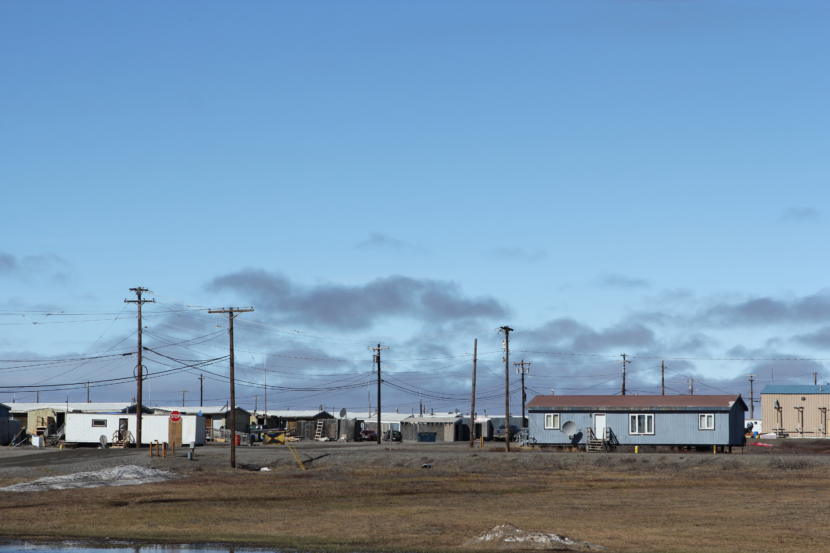
The Washington Post made the North Slope village of Nuiqsut front page news earlier this month, under a provocative headline: “Alaska’s warming, but can’t quit big oil.”
Nuiqsut is at the edge of the National Petroleum Reserve in Alaska, and it’s surrounded by and benefits from oil development — a predicament Alaska’s Energy Desk covered in an episode of our podcast Midnight Oil earlier this year.
Post reporter Juliet Eilperin looked at the village through a different lens, exploring its place in the global debate over climate change. She started by talking about the village’s relationship to the oil industry.
Nuiqsut is inextricably linked with oil development. And the reason I say that is because after it was resettled in the 1970s, there was a period where it was able to subsist largely on a combination of federal and state funds for a couple of decades. But starting in the early to mid 1990s, it became clear that the community would need another source of revenue. And really, it was oil drilling that saved Nuiqsut and brought it in to the modern era. It was a deal that was struck even before oil drilling began in the late 1990s, with first ARCO, and later ConocoPhillips, that provided a share of oil royalties to the tribal corporation. And also by extension, a slew of benefits to community residents. The heating that keeps every Nuiqsut home warm and comfortable for $25 a month is supplied by ConocoPhillips. When you visit almost any major building or site in town, it has been supported by the oil firm. It has become the economic lifeblood of this community.
You actually wrote in your story, people in Nuiqsut don’t talk much about climate change. I wonder what it was like for you to go to the place that you described as one of the fastest warming places in the entire world and have people not really talking about it there.
It was illuminating, that climate change is not as central to the discussion there, even among the folks who are raising the issue of whether there should be limits on oil drilling. And it was interesting people would certainly describe a lot of the impacts of climate change and how it affected them. But they were much more hesitant to bring it up and frame it in terms of this larger debate that folks are having on climate change and global warming.
You also described Martha Itta, who is the head of Nuiqsut’s tribal government in your story. It says, “She has opted to fight further drilling, even though it is unclear what could sustain the economy in place of oil.” And I’m curious what you make of Nuiqsut’s options here, when we think about the village’s place in the global debate about climate change, and how to transition away from fossil fuels.
I asked almost everyone, what would be another economic route, Nuiqsut could pursue in order to achieve say, independence from oil drilling revenues. And folks really struggled to offer answers on this. And I actually thought that people approach the question with an open mind and very few people offered concrete ideas of what could take the place of oil drilling revenue, and that’s certainly a hurdle that Nuiqsut would face. If it chooses to go another way.
You’re talking about Martha Itta as someone who’s sort of trying to convince the village of the need to maybe transition away from fossil fuels or to reconsider the village’s relationship to the oil industry. And then you write that, “The question is not only whether she can convince her own neighbors, it’s whether Alaskans with the signs of climate change all around them are ready to make some tough choices.” What is that choice between?
I think it’s a choice between a certain present and an uncertain future. And so in other words, there is no question that what Alaska has known since statehood is exploitation of its natural resources. I don’t think anyone should minimize the extent to which — whether it is mining or drilling or logging — has helped bring prosperity to this state. And so that is foundational to Alaska’s trajectory from statehood to the present. And so the question is, going forward, is this the path that Alaska will continue to pursue? Or is there another route? And what would that look like? And I think the real question is, is there an alternative that Alaskans could get behind, that they would feel confident enough that it offered them an economic alternative that they could pursue it? And that’s again, it really is obviously a question for Alaska. But to me, grappling with that uncertainty and trying to devise an alternative is really one of the choices that lies ahead for the state.
You know, I got a couple folks after the story published who kind of said, you’re making it sound like it’s the Inuit’s job to quit oil and like, you’re making it sound like, you know, the Inupiat are oil-addicted. And part of what I really tried to make clear is that, you know, this is a super intense version of the choice that we all face while it’s crystallized in Nuiqsut, it’s kind of every Alaskan, every American, every person needs to recognize that this is a system we all take part in and that we all face the ramifications of it some disproportionately to others.